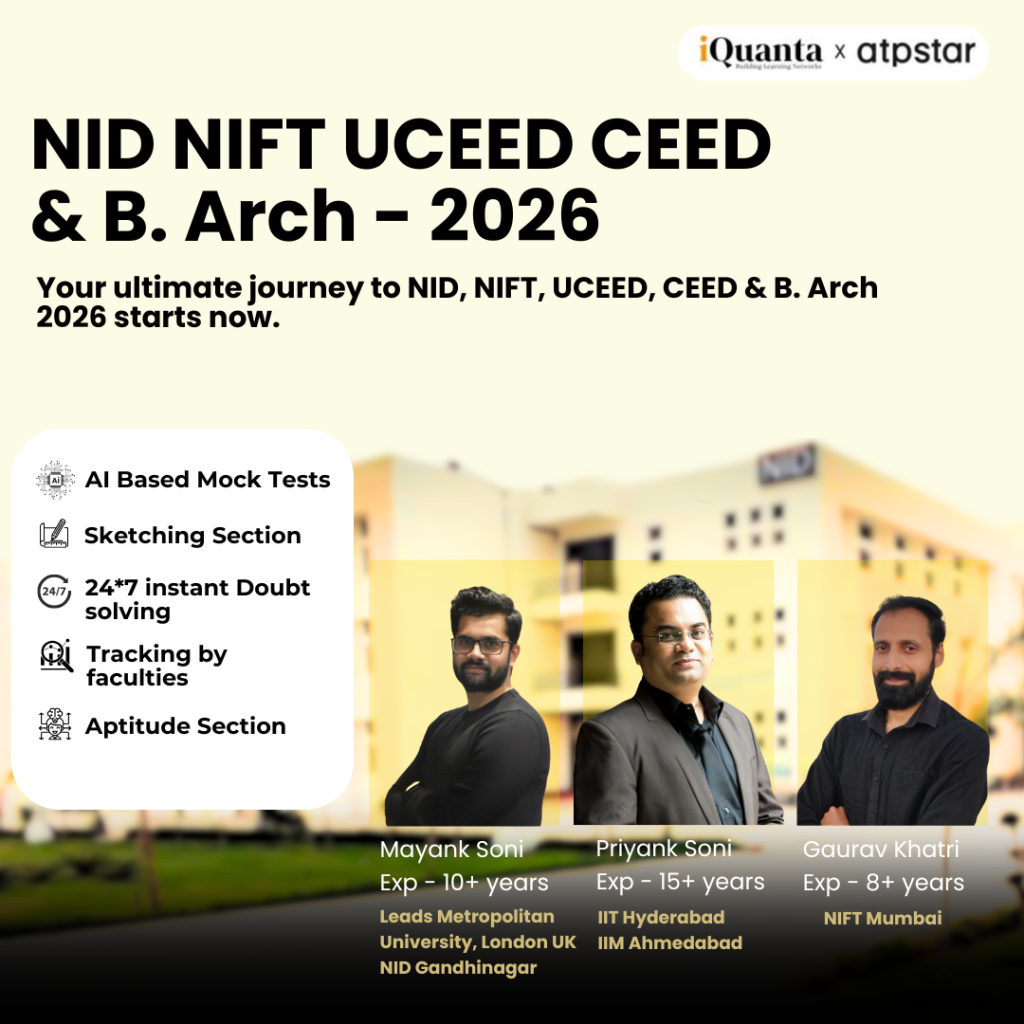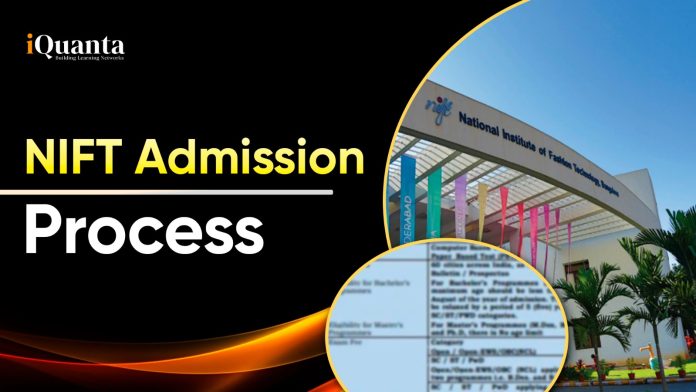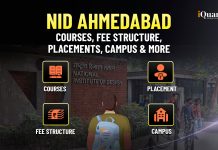The NIFT admission process is the official gateway for aspiring designers to enter the prestigious National Institute of Fashion Technology (NIFT). Established in 1986 by the Ministry of Textiles, NIFT is recognized as the premier institute for fashion education in the country. Every year, over 25000+ students compete for the NIFT entrance exam for a limited number of seats for various UG & PG courses. NIFT offers a total of 5 major programs—Bachelor of Design (B.Des), Bachelor of Fashion Technology (B.F.Tech), Master of Design (M.Des), Master of Fashion Technology (M.F.Tech), and Master of Fashion Management (M.F.M). With 19 campuses in top cities like Delhi, Mumbai, Bangalore, Kolkata, and Chennai, NIFT has an approximate total seat intake of 5500+ seats annually, varying as per course and category.
Apart from academic excellence, NIFT is known for its infrastructure, industry collaborations, and impressive placement records. The annual fee structure for NIFT courses ranges between Rs. 1.5 lakhs to Rs. 2.5 lakhs per annum for UG programs, while PG programs may cost around Rs. 2.75 lakhs to Rs. 3.5 lakhs per year, depending on the campus.
The NIFT admission process 2025 includes several stages—from online registration, written exams (CAT & GAT), the situation test, GD/PI, to final conselling and seat allotment. This comprehensive guide will walk you through each step, including eligibility, exam pattern, seat matrix, fee details, and counselling procedure, to help you navigate your way to India’s top fashion institute.
Join this free whatsapp group to get preparation strategies, resources, and updated information about Design exams

NIFT Admission Process Overview
The NIFT admission process is the official process through which thousands of design aspirants apply for NIFT UG & PG courses like B.Des, B.F.Tech, M.Des, M.F.Tech, and M.F.M through the NIFT entrance exam. The NIFT admission process is a multi-stage selection that assesses candidates on various parameters like creativity, technical knowledge, general aptitude, and problem-solving abilities. The entire process involves the following steps:
- Online Registration: The NIFT admission process begins with online registration on the NIFT official website, www.nift.ac.in. Candidates must fill out their personal, academic, and contact details; upload the required documents; and pay the application fee of Rs. 3,000/- for General/OBC and Rs. 1,500/- for SC/ST/PwD.
- NIFT Entrance Exam: For NIFT admission, candidates are required to appear for two phases, i.e., the Creative Ability Test (CAT) and the General Aptitude Test (GAT). The CAT exam evaluates design aptitude, creativity, and innovation. Whereas, the GAT exam tests quantitative ability, communication skills, analytical ability, GK, and English comprehension.
- Situation Test / Group Discussion & Personal Interview: For NIFT B.Des, candidates need to appear for the Situation test which assesses material handling and innovative problem-solving. For NIFT PG courses (M.Des, M.F.Tech, M.F.M), candidates will appear for a GD/PI round which evaluates leadership, communication, and subject knowledge.
- Declaration of Results: The NIFT result will get declared in stages, like written exam scores, followed by merit list announcement after the Situation test / GD & PI. Candidates can check their NIFT result on the official portal, www.nift.ac.in.
- Counselling & Seat Allotment: The final phase of the NIFT admission process is counselling. Candidates, based on their NIFT scores, are allotted seats across 19 NIFT campuses after document verification and fees payment for the allotted NIFT campus.
NIFT Eligibility Criteria
Before applying for the NIFT admission process, candidates must fulfill the NIFT eligibility criteria as per the NTA. The eligibility varies depending upon the course—UG & PG:
NIFT Eligibility for UG Programs—B.Des & B.F.Tech
| Criteria | Bachelor of Design (B.Des) | Bachelor of Fashion Technology (B.F.Tech) |
| Educational Qualification | 10+2 from a recognized board or equivalent | 10+2 with Physics, Chemistry, and Mathematics from a recognized board |
| Age Limit | Maximum 24 years as of 1st August 20255-year relaxation for SC/ST/PwD candidates | Maximum 24 years as of 1st August 20255-year relaxation for SC/ST/PwD candidates |
| Qualifying Subjects | Any stream (Science, Commerce, Humanities) | Mandatory PCM subjects (Physics, Chemistry, Mathematics) |
NIFT Eligibility for PG Programs—M.Des, M.F.Tech & M.F.M
| Criteria | Master of Design (M.Des) | Master of Fashion Technology (M.F.Tech) | Master of Fashion Management (M.F.M) |
| Educational Qualification | Undergraduate degree from NIFT, NID, or any recognized university | B.F.Tech from NIFT, or B.E/B.Tech from any recognized university | Undergraduate degree from NIFT or any recognized university |
| Age Limit | No age limit | No age limit | No age limit |
| Qualifying Subjects | Design, Fine Arts, Applied Arts, Architecture, Science, Engineering, Commerce, Humanities | B.F.Tech, B.E, or B.Tech (applicants from other streams are not eligible) | Any graduate discipline |
Join this free whatsapp group to get preparation strategies, resources, and updated information about Design exams

NIFT Selection Process Criteria
The NIFT selection criteria differ for UG & PG programs. Here’s a detailed breakdown of NIFT selection process criteria with weightage:
Course | Weightage | |||
| CAT | GAT | Situation Test | GD & PI | |
| B.Des (4-year) | 50% | 30% | 20% | – |
| B.F.Tech (4-year) | – | 100% | – | – |
| M.Des (2-year) | 40% | 30% | – | 30% |
| M.F.Tech (2-year) | – | 70% | – | 30% |
| M.F.M (2-year) | – | 70% | – | 30% |
NIFT Seat Matrix—Course-wise
The NIFT seat matrix refers to the numbers of seats available for different programs across its 19 campuses in India. The seat intake varies for B.Des, B.F.Tech, M.Des, M.F.Tech, and M.F.M programs depending on campus capacity and specializations offered.
Here’s the course-wise seat matrix for NIFT:
| Course | B.Des | B.F.Tech | M.Des | M.F.Tech | M.F.M | Total Seats |
| NIFT Delhi | 312 | 126 | 60 | 30 | 60 | 588 |
| NIFT Mumbai | 312 | 126 | 60 | – | 60 | 558 |
| NIFT Bangalore | 288 | 126 | 60 | 30 | 60 | 564 |
| NIFT Kolkata | 288 | 126 | 60 | – | 60 | 534 |
| NIFT Chennai | 240 | 126 | 60 | – | 60 | 486 |
| NIFT Hyderabad | 240 | – | 60 | – | 60 | 360 |
| NIFT Gandhinagar | 216 | 126 | 60 | 30 | 60 | 516 |
| NIFT Patna | 180 | 126 | – | – | – | 342 |
| NIFT Kangra | 180 | 126 | – | – | – | 306 |
| NIFT Bhopal | 180 | – | – | – | – | |
| NIFT Shillong | 180 | – | – | – | – | 180 |
| NIFT Kannur | 180 | 126 | – | – | – | 306 |
| NIFT Jodhpur | 180 | 126 | – | – | – | 306 |
| NIFT Bhubaneshwar | 180 | 126 | – | – | – | 306 |
| NIFT Raebareli | 180 | 126 | – | – | – | 306 |
| NIFT Srinagar | 180 | – | – | – | – | 180 |
| NIFT Panchkula | 180 | – | – | – | – | 180 |
| NIFT Daman | 120 | – | – | – | – | 120 |
| NIFT Varanasi | 120 | – | – | – | – | 120 |
Note: Actual seat numbers may vary slightly based on NIFT’s official notification.
NIFT Fee Structure—Course-Wise
The NIFT fee structure includes tuition fees, library fees, mediclaim fees, exam fees, campus amenities, and security deposits. The fee structure differs for NIFT UG & PG courses.
NIFT UG Fee Structure (B.Des & B.F.Tech)
| Component | Fees – Per Year |
| Tuition Fee | Rs. 1,80,000/- |
| Library Fee | Rs. 9,000/- |
| Mediclaim & Student Development Fee | Rs. 3,500/- |
| Exam Fee | Rs. 5,000/- |
| Security Deposit (one-time, refundable) | Rs. 10,000/- |
| Total (1st year) | Rs. 2,07,500/- |
Note: From the 2nd year onwards, the security deposit is excluded.
NIFT PG Fee Structure (M.Des, M.F.Tech, M.F.M)
| Component | Fees – Per Year |
| Tuition Fee | Rs. 2,30,000/- |
| Library Fee | Rs. 10,500/- |
| Mediclaim & Student Development Fee | Rs. 3,500/- |
| Exam Fee | Rs. 5,000/- |
| Security Deposit (one-time, refundable) | Rs. 10,000/- |
| Total (1st year) | Rs. 2,59,000/- |
Note: PG fees from the 2nd year onwards gets reduced by Rs. 10,000/- (security deposit excluded).
NIFT Admission Counselling
After the declaration of NIFT results, shortlisted candidates are invited for the NIFT admission counselling process. It is conducted online and involves seat allotment based on merit ranks, category, and campus preference.
Key steps involved in NIFT Counselling:
- Online registration for councelling: This registration for counselling is separate from exam registration.
- Choice filling: Candidates are required to select preferred campuses and courses.
- Document verification: The certificates and documents submitted by candidates will go through an online/offline verification process.
- Seat Allotment: After successful document verification, provisional allotment will be done based on NIFT rank and choices filled by the candidates.
- Fee payment & seat acceptance: Students are required to pay the admission fee to confirm the allotted seat.
- Reporting to the allotted campus: This final step involves physical verification of students at the allotted campus and the commencement of the NIFT program.
Documents required for NIFT Counselling:
- NIFT Admit Card & Scorecard
- 10th & 12th Marksheets
- Category Certificate (if applicable)
- Medical Fitness Certificate
- Identity Proof
- Provisional Allotment Letter
- Passport-size Photographs
The NIFT admission process is a detailed, multi-stage evaluation aimed at selecting the most creative and skilled aspirants for the fashion and design industry. From eligibility and entrance exams to campus-wise admissions and counselling, each step is crucial. Candidates are advised to stay updated and well-prepared to crack the NIFT entrance exam and secure the seat at your desired NIFT campus.
Join iQuanta and Ace the NIFT Entrance Exam
Crack the NIFT entrance exam with iQunata’s well-structured and thorough course structure. Get the NIFT coaching from renowned design faculties, 24*7 doubt-solving assistance, personalized preparation techniques, and relevant content to stay focused and ace the NIFT exam and gain admission to top design universities.
Join us and experience the new age of learning, where top-notch content meets advanced technology, expert guidance, and unwavering support. Get ready to conquer the NIFT Entrance Exam with the iQuanta NIFT Online Course.





